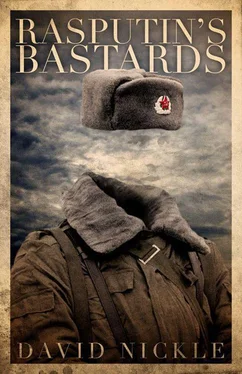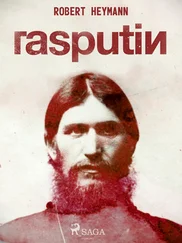He came up in a long room — maybe as long as the whole submarine, and like the submarine, somewhat cylindrical. Lights were positioned regularly near the ceiling — little red globes beneath wire encasements. Some of the lights were dark, and beneath them, the pools of night were absolute.
The Morlock — or vampire or pod person or sea hag — hovered naked at the edge of one of those pools. Stephen called out to it. But it didn’t answer with even a bleat this time. It simply motioned to Stephen to follow it to the end of the cylinder, where even at this distance Stephen could see a hatch.
He hurried to catch up — to get a better look at the thing. But it was faster than he, and opened the door and vanished through it before Stephen could see much more than a naked ass and hair that fell below its pale shoulder blades. Stephen found himself panting the stale air, as he stumbled into the new corridor. He called out again — but no one answered. No echoing hellos; no whispers of “Help us.” No pok-pok-pok on the hull.
Even the Morlock was gone by now.
Stephen realized with a sinking feeling that he was, for all intents and purposes, alone in Petroska Station. The corridor he was in was narrow, and went in three directions: left, right, and in a narrow tube with ladder rungs cut into it, straight up.
It was a long way from his Cuban plantation. It was nearer to the strangeness of Chenko’s ancient Antarctic city.
But as Stephen began to think about the implications of a giant station built by Russians, this close to the United States — the reality of this place was stranger than anything any of them could imagine.
Stephen spent what seemed like hours wandering the halls. The further he went, the more it seemed like a bizarre dream. He walked through four huge chambers with great rectangles of greenish water underneath bright white lamps; an infirmary with a dozen beds, attached to two operating rooms; another room with another pool — the water’s surface clear, and only somewhat green — with things that could only have been hard-shell diving suits hanging from the ceiling like sides of beef. On a second level, a great domed room filled with blinding white light and rows and rows of hydroponically grown plants: carrots that dangled in murky water like foetuses, and twisting vines of tomatoes the size of a boy’s head, and huge zucchinis and stalks of beans. There was a control room with banks and banks of old monochrome computer monitors that flickered with amber and green firelight. And there was a great kitchen, with pots that dangled from hooks and a huge walk-in freezer.
Here, he finally found some of the missing Romanians. They had the freezer door off its hinges, and were working with glue and staples on the seal around it. None of them would have given Stephen any notice on the submarine. Here, they stopped what they were doing, looked up and smiled at him.
“Stephen Haber,” said one.
“Old Fyodor,” said another.
“Kolyokov’s apprentice,” said another.
“It is good to see you here finally,” said a third. “We thought Fyodor was lost to us for good.”
Stephen was fascinated. The three men were speaking perfect English — without a trace of the heavy accent that had scarred their speech on board the submarine. And when they moved — it was without the peculiar rhythm that Zhanna and her brood forced them into.
Stephen snapped his fingers and pointed.
“You,” he said, “are the Mystics.”
The three Romanians nodded as one. Two others continued to work inside the freezer, pulling apart a complicated tangle of coils. Stephen caught a movement out of the corner of his eye — and saw two figures similar to the pale thing that had greeted him below. They stooped over, hauling an oblong green crate between them towards the freezer.
“Forgive us,” said one of the Romanians.
“The freezer hasn’t been working,” said another.
“… properly for years,” said a third.
“That and a hundred other systems around here,” said the first.
“Our People accomplished a great many things in the Great Experiment — but they did not, I fear, build things to last,” came a voice from behind him — a fourth Romanian.
“So,” said Stephen slowly, working it out as he spoke, “when you took the nine men from the submarine, it was… to fix your refrigerator.”
“Freezer,” said one of the two Romanians working on the coil. “And…”
“… some other things,” said his partner. “It is a good thing this place was never tested by nuclear war. It wouldn’t have lasted.”
The Romanians all turned back to their task. Stephen stood there for a moment, watched as the Morlocks dropped the box at the door. It made a clang. The Morlocks bleated at each other, and shuffled out of the kitchen.
“You see,” said a Romanian, “the ones who’ve been here a while just aren’t up to it anymore.”
“Like old tractors,” said another.
“They have lost their pull .”
Stephen nodded. “So you press-ganged our crew,” he said, “because they are up to it. For now.”
“Close enough,” said a Romanian, and gave him a look. “You look like a strong boy yourself,” he said. “Care to lend a hand?”
Stephen dragged over the box — which was filled with spare canisters and parts for reassembling a fan. He had never repaired a large industrial freezer before — but he found himself catching on to the muttered instructions. As they were putting the huge vault-like door back in place, he wondered aloud why it was they even needed a freezer down here.
“I’d think it was just about cold enough outside to preserve anything, this deep,” he said.
One of the Romanians laughed. “Listen to the oceanographer,” he said. “ It is cold enough to preserve anything, we are so deep! ”
“Yes, well he makes a good point. Isn’t that why we came here? To preserve us ?”
“And what a good job we’re doing.”
One of the Romanians turned to him. “It’s true,” he said, “that it’s cool outside. But the freezer is better run by electricity. That is something we have no shortage of here.”
Stephen nodded. He described the power plant that he saw, and the Romanians all nodded.
“See? Smart boy. It’s a geothermal plant. Very high tech in 1977.”
“Would have been a Nobel Prize in it, if it were made by an American.”
“Would have never been made by an American.”
“So clever, they think they are.”
“1977?” said Stephen. “Is that how long this thing has been down here?”
“No. That was when it was planned. I don’t think they sank the spike until — when was it?”
“1982. That was when Reagan was making all those threats. Remember?”
“Oh, like it was yesterday.”
“We were the ‘evil empire.’”
“And they had no idea how far it went.”
“So true.”
“This thing,” said Stephen slowly — working it out as he went, “has been underwater — off the coast of the United States — undetected — for seventeen years ?”
“Oh yes.”
“And you’ve been down here—”
“Seventeen years.”
Stephen leaned back against the wall of the galley.
“And how the fuck,” he asked, “did you manage that?”
“Well at first — it was a big secret project. Approved by Brezhnev himself. We thought we could inhabit the ocean’s floor. It would be better than the space program. Build a secret city — a secret country — under the sea.”
“It was fantastically expensive — but those were the good days for the ‘evil empire.’ We had lots of rubles to spend on big things.”
“At first we were going to put it in the Black Sea. Wasn’t too deep, and we could send ships to it from Odessa. It wouldn’t be a threat to anyone. Then some of us started thinking: why not be more ambitious? We had already managed to cloak whole installations, using our talents. Why not build it under the Americans’ noses?”
Читать дальше












